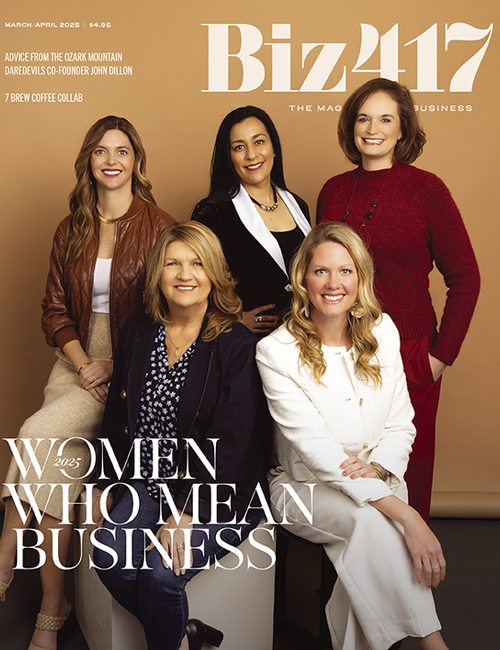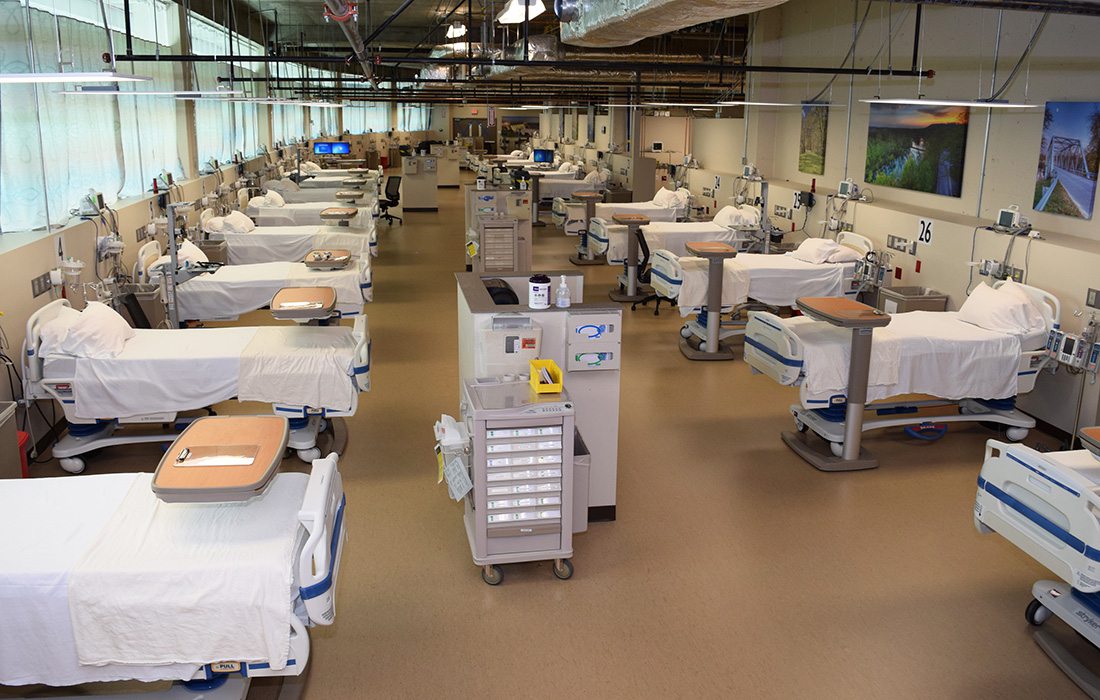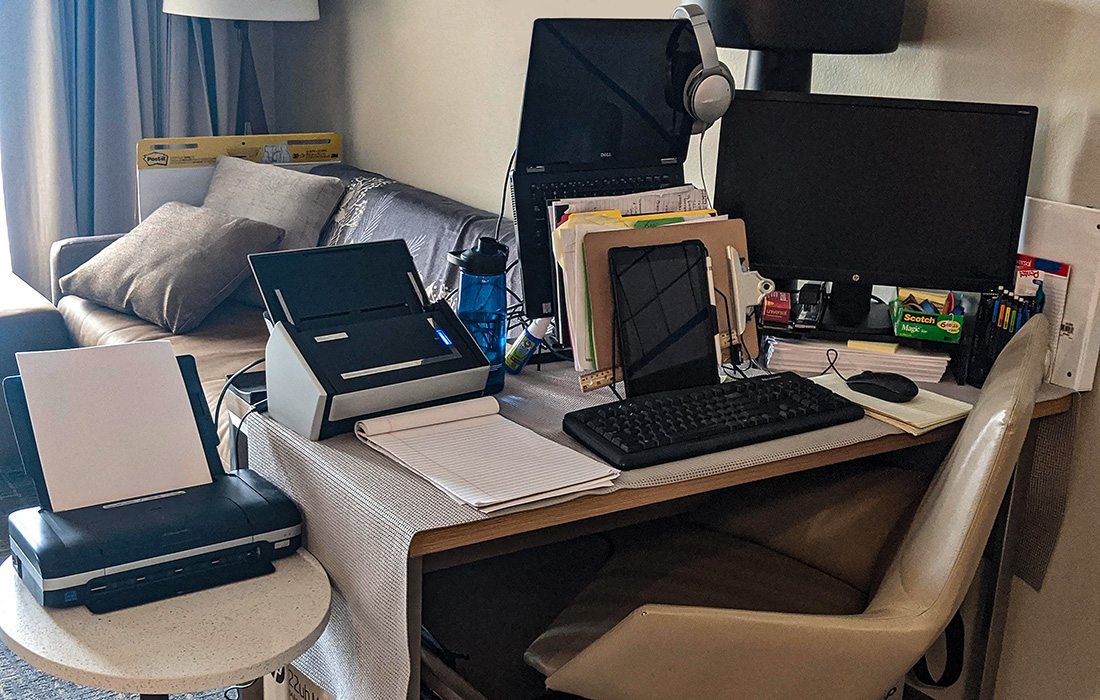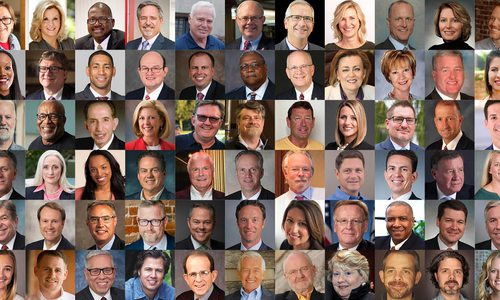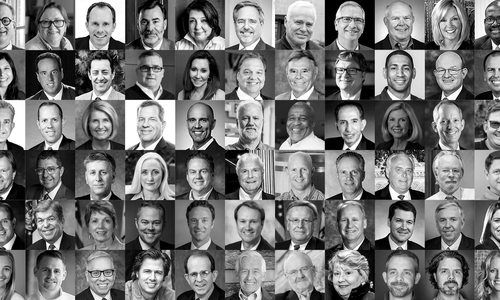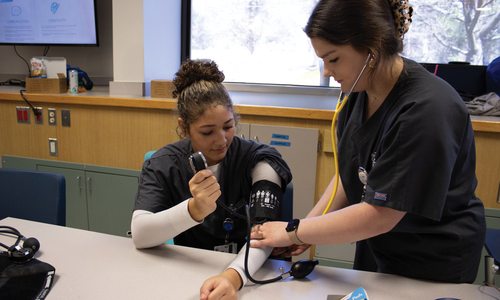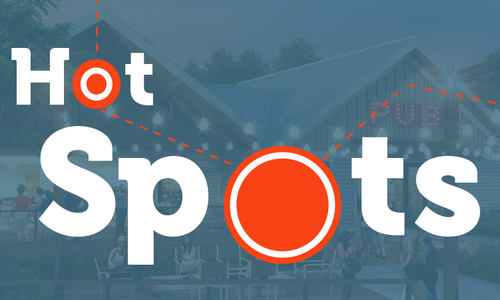When the COVID-19 pandemic disrupted life in southwest Missouri, local businesses had to find ways to adapt to survive. For some that meant pivoting to create different products or serve different customers. For others it meant finding creative ways to get their products out and keeping the customers they already had. We asked 33 businesses spanning a variety of industries what they were doing to respond to a crisis. Here are their firsthand accounts showing just how creative and compassionate our region is during unprecedented times.
Leadership
The Big Pivot: How Southwest Missouri Businesses Responded to the COVID-19 Crisis
33 southwest Missouri businesses share their COVID-19 success hacks and strategies that helped them quickly pivot into a new way of doing business.
By Jenna deJong and Gary Whitaker
May 2020

Photos courtesy CoxHealth LEFT: Work begins on the COVID-19 unit in what was shell space at Cox South. RIGHT: The finished unit was unveiled in April 2020 two weeks after work began.
Healthcare Response to COVID-19 Crisis
For local health institutions, pivoting meant rethinking how to save lives. “I think it happened very rapidly,” says Craig McCoy, president of Mercy Springfield Communities. “We saw a presence of coronavirus overseas in China and some other countries, but once it came to the U.S. the spread began happening very fast. I think the difference was there was so much unknown about this, even still today. It forced us into a mindset of planning for the worst.”
CoxHealth and Mercy were not immune to national trends like a shortage of personal protective equipment (PPE) and SARS-CoV-2 testing kits. On March 21, nine days after the first presumptive positive COVID-19 Greene County case was announced, Steve Edwards, CoxHealth president and CEO, took to Twitter, asking the public for PPE and calling on dentists, manufacturers and more to donate what they had available. Before COVID-19, CoxHealth used approximately 40 N95 masks per month. That number grew to 1,000 per day. At press time, it fell to 530. According to Media Relations Manager Kaitlyn McConnell, CoxHealth has “up to 250,000 N95s on order, but shipments are being pulled and redirected.” Like hospitals across the country, both CoxHealth and Mercy witnessed price gouging related to PPE. At the beginning of April, Edwards tweeted that “supply is disrupted and filled with profiteering middlemen and counterfeits. N95 masks were $.62 now $6.50, gowns were $.24, and now $4.50.”
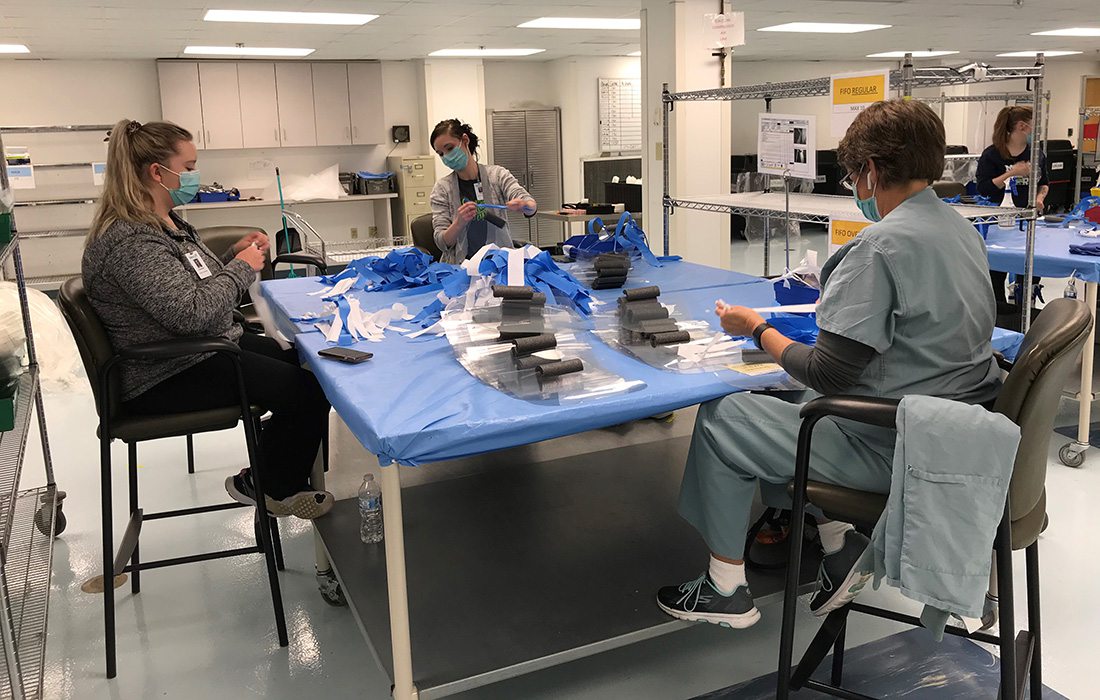
Edwards’ actively engaged social media presence is difficult to ignore, and his tactics are working. Local organizations like the Ozark Trails Council and Grizzly Industrial, Inc. both donated Nitrile gloves, while Harbor Freight Tools, Great Southern Bank, Jordan Valley Innovation Center, Convoy of Hope and Bass Pro Shops donated much-needed N95 masks that, according to one of Edwards’ tweets, “have higher protective value than surgical masks, and are protective for procedures such as intubations.” Others including Askinosie Chocolate, Ozarks Coca-Cola/Dr Pepper Bottling Company, Ott's Pasta and Texas Roadhouse have donated food and products to feed staff. But perhaps the biggest collaboration and problem-solving tactics of all are CoxHealth’s 51-bed COVID-191 ICU unit built in two weeks, and Mercy’s use of resources to produce PPE.
On March 25, CoxHealth posted a press release describing its ambitious efforts related to its COVID-19 unit. According to the release, “in two weeks, by April 9, a new hospital—within a hospital—for COVID-19 patients will come to life within Cox South.” According to Edwards’ tweets, JE Dunn Construction and other subcontractors worked day and night to build a 51-bed ICU unit just for COVID-19 patients. According to a release, the ward-style floor offers an “even greater opportunity to care for patients, as they will be located in large open spaces as opposed to individual rooms.” It’s a benefit because “the change will also allow for conservation of personal protective equipment.”
The project cost $700,000, and Edwards says JE Dunn and its subcontractors took no profit or overhead. By April 7, Edwards tweeted that “the unit is finished, equipped, supplied and ready to go.” The speed at which the project was finished was also in part to reopen the local economy. “As the city anticipates opening up, they ask the hospitals, ‘are you ready’ and if we did not have this unit, we could not tell them we’re ready,” Edwards says. After the project's completion, Robert and Lawana Low, on behalf of Prime Inc., donated $700,000 to cover the costs of construction, and the Sunderland Foundation donated $200,000 to cover equipment costs.
Mercy Springfield Communities took a different approach to fighting COVID-19, instead reallocating its staff and resources to provide PPE for its workforce. Since COVID-19 began infecting the local community, Mercy has increased its number of negative pressure rooms from 60 to 255, which correlates to expanding its capacity to over 1,500 beds for infectious patients. In addition to constructing a forward triage center outside its emergency entrances, Mercy Springfield Communities set up four in-house production lines to produce face shields and masks for its team of 10,000 employees. According to Sam Spencer, vice president of operations, the health organization reallocated 60 co-workers to manufacture PPE. Spencer says Mercy began buying raw materials such as surgical drapes, which Mercy nurses and technicians then cut into masks to be sewn. Spencer says this new operation was a win-win: Employees whose work was put on hold due to COVID-19 were now producing items the hospital desperately needed.
Staff packed the supplies into sewing kits, which were then delivered to community members and groups to sew and assemble. Spencer says the surgical shields, which were made from the very same material as the masks, turned out to be a better quality than the ones Mercy was buying because they could be cleaned and reused. Since production began, Mercy staff have assembled 50,000 face shields and nearly 20,000 mask kits, of which 10,000 have been sewn.
“In dealing with a situation like this, we need to come together and use the strength of both of our organizations to take care of the community in the best way possible.”— Craig McCoy, president of Mercy Springfield Communities
Though Mercy and CoxHealth are deploying their own methods and contingency plans, both are collaborating almost daily to address the local response to COVID-19. McCoy, who began his new role as Mercy Springfield Communities president in January this year, says though the situation is dire, it forced both him and Edwards to cooperate and form a solid relationship sooner rather than later. McCoy says he and Edwards were on the phone four or five times a day in early March. It was during those calls that the two organizations decided to halt elective, non-urgent surgeries the same day, in addition to restricting visitor guidelines and alternating sending staff to operate the off-site testing center. Now the dialogue has changed, as the two focus on getting things back to normal.
“Any time you’re dealing with a major situation like this, especially a pandemic like this, these should not be competitive situations,” McCoy says. “In dealing with a situation like this, we need to come together and use the strength of both of our organizations to take care of the community in the best way possible.”
Local Business Response to COVID-19 Crisis
As CoxHealth and Mercy Springfield Communities began thinking of ways to heal patients with limited resources, the business community had to come up with various solutions as the community socially distanced. From brainstorming additional revenue streams to community-wide fundraisers to new collaborations, the business community is finding a way to persevere. Read how manufacturers, retailers, restaurants, nonprofits and more are fighting COVID-19.
5 Pound Apparel | Retail
The hurdle: “The first hurdle was the fact that our physical stores had to close, making our relied-upon daily foot traffic vanish overnight,” says Brina Thomas, co-owner of 5 Pound Apparel. “[We had] to convert our local in-store customers to online […] We have experienced major supply chain issues from t-shirt warehouses [and] manufacturers closing to delays in printing t-shirts.”
The pivot: “With our physical stores being closed, our only true way to generate revenue is through our online store,” Thomas says. “This means we had to be creative with bundling what we do well, like t-shirts and locally branded gear into new customer-friendly offerings that have helped us generate a substantial increase in online sales. First, we created a T-Shirt Club. For $100, the member will receive a newly designed t-shirt each month for five consecutive months. The goal is to generate working capital now, while rewarding loyal customers with a fun new monthly product offering and great deal. There’s been great response with more than 100 club memberships sold.” In addition, the retailer implemented local delivery and free shipping and offered “Support SGF” shirts and stickers to “give people a chance to show support of local businesses.” According to Thomas, customers get to choose the local business that receives $15 from the sale of the shirt. 5 Pound Apparel has sold out of these shirts more than three times and have sold more than 300 altogether.
Burrell Behavorial Health | Health & Wellness
The hurdle: “COVID-19 has changed the ways we live and how we connect and interact in our day-to-day relationships,” says C.J. Davis, Burrell Behavioral Health President and CEO, in a press release. “Mental health services absolutely have to change with it. There’s another ‘curve’ coming behind the COVID curve, and that is the developing mental health crisis.”
“There’s another ‘curve’ coming behind the COVID curve, and that is the developing mental health crisis.”— C.J. Davis, Burrell Behavioral Health President and CEO
The pivot: According to the release, Burrell has launched virtual group services. This includes a group exclusively for health care and essential workers, as well as “free videos that provide education about the acute stress response and how to handle it, as well as access to a regular, anonymous, telephonic group session just for frontline workers.” The organization is also offering free “Coping with COVID” group services over the phone to the public, hosting daily check-ins over Facebook and more.
Community Foundation of the Ozarks | Nonprofit
The hurdle: Brian Fogle, president and CEO of Community Foundation of the Ozarks (CFO), says nonprofits are hit differently. Fogle says organizations that target vulnerable populations such as the homeless and senior citizens saw an increase in need to keep these groups safe but with less funding. Art-focused groups saw critical fundraising events cancelled.
The pivot: To combat the widespread problems, CFO reached out to two organizations to launch the COVID-19 Response and Recovery Fund. Together, CFO, the Missouri Foundation of Health and the Louis L. and Julia Dorothy Coover Charitable Foundation managed by Commerce Trust Company donated $1 million. In the last month, others donated a combined $300,000, which will “support nonprofits affected by disruptions due to the coronavirus outbreak,” according to a press release. At press time, CFO granted $335,100 to 32 agencies including the Isabel’s House Crisis Nursery, Harmony House and more. A group of five compose the grants committee and decide which nonprofit receives a grant. This committee was formed for nonprofits struggling due to COVID-19.
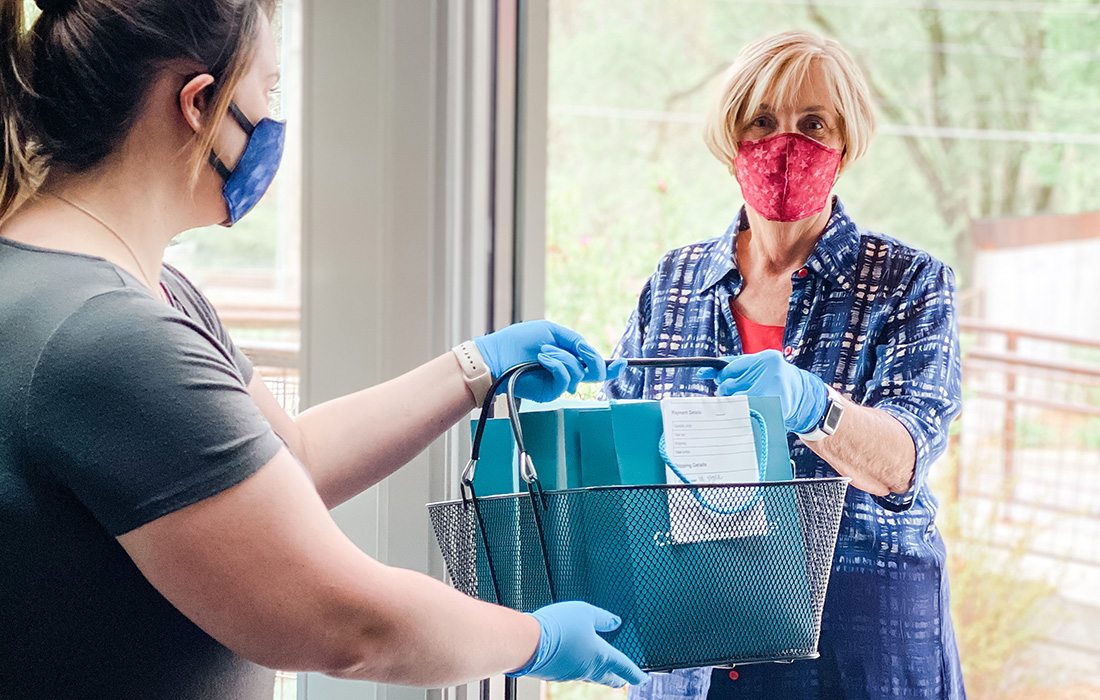
Acacia Spa | Health & Wellness
The hurdle: Acacia Spa could no longer offer its services in person once it closed its doors.
The pivot: The spa began offering quarantine kits. According to the company’s Instagram account, it offers three pampering options for pickup.
Beautyrest Sleep Gallery | Small Business
The hurdle: “Beautyrest Sleep Gallery is not considered an ‘essential’ business, so trying to figure out how to best accommodate our customers, safely and under the [Centers for Disease Control and Prevention] and state and local guidelines has been challenging, to say the least,” says Ursula James, president and CEO of Beautyrest Sleep Gallery.
The pivot: “We have been relying upon online appointments to schedule curbside pickup of mattresses purchased before the lockdown occurred and online orders for delivery to the customers—usually the Bed-in-a-Box,” James says. “We have also been diligent about disinfecting our showroom, including the addition of disposable pillow covers for customers to use once the lockdown has been lifted.”
Big Time Results and Fitness E.R. | Health & Wellness
The hurdle: “We diversified several years ago to add Fitness E.R., a business to sell, repair and refurbish gym workout equipment,” says Noah Alldredge, owner of Big Time Results and co-owner of Fitness E.R. “Our core business before was repairing gear at other gyms, hotels, schools, universities, etc.”
The Pivot: “Fitness E.R. has had to pivot from doing mainly repairs at other gyms, hotels, apartments, corporate gyms to selling equipment [for home gyms],” Alldredge says. “Since the lockdown, we have sold three times more equipment than our previous best month and have had problems maintaining inventory in certain items. We had our best month of selling equipment in March.”
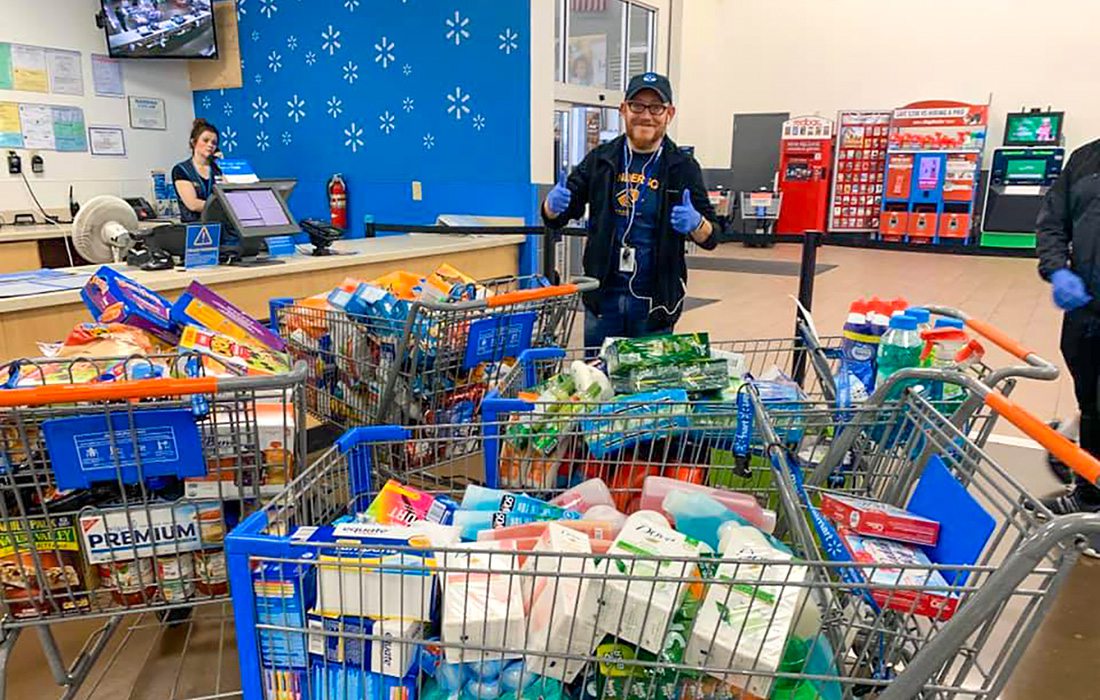
Boys & Girls Clubs of Springfield | Nonprofit
The hurdle: “We had to close our doors on March 18 in order to make the safest, best, most well-informed decision for our kids, families and staff,” says Brandy Harris, chief executive officer of the Boys & Girls Clubs of Springfield (BGCS). “The emotional impact this has had on our kids, families and staff is incredibly difficult.” Not only that, but the club had to cancel fundraisers, including an annual event that raised $500,000 last year.
The pivot: According to a press release, BGCS has implemented alternative services and programming in collaboration with strategic partners. This includes serving more than 20,000 meals in 23 days at three locations across Springfield, asking parents about urgent needs, creating virtual programming and performing wellness checks via phone calls.
Greek Corner Screen Printing and Embroidery | Small Business
The hurdle: “We were just coming out of winter, which for the screen printing industry is very slow,” says Jason Parke, owner of Greek Corner Screen Printing and Embroidery. “During that time, we keep expenses to a minimum and anxiously await spring. Business usually picks up right after spring break. Just as spring break arrived, the panic hit. New orders stopped. It was like someone turned off a faucet. We do a significant amount of printing for schools, which include music festivals and field trips to Silver Dollar City. In addition, we are the official embroidery and screen printer for Missouri State Athletics. When the schools shut down, we lost tens of thousands of dollars in revenue. We had to furlough our entire staff.”
The bright spot: The shop created HereForGood417.com and takes orders, prints the shirts, ships them and sends the business owner a check each week for $10 per shirt sold. “The campaign is not so much to generate revenue for us, but to help fellow small businesses and not-for-profits. The goal is to help small businesses survive this crisis. Most of our customers are small businesses. If they don’t survive, neither will we… In addition to the satisfaction of helping others, our brand has received more exposure. In this short time, we have worked with businesses that have never used us before. Three of them hired us to create new company stores for their business. To date we have raised over $4,000 for local businesses and not-for-profits.”
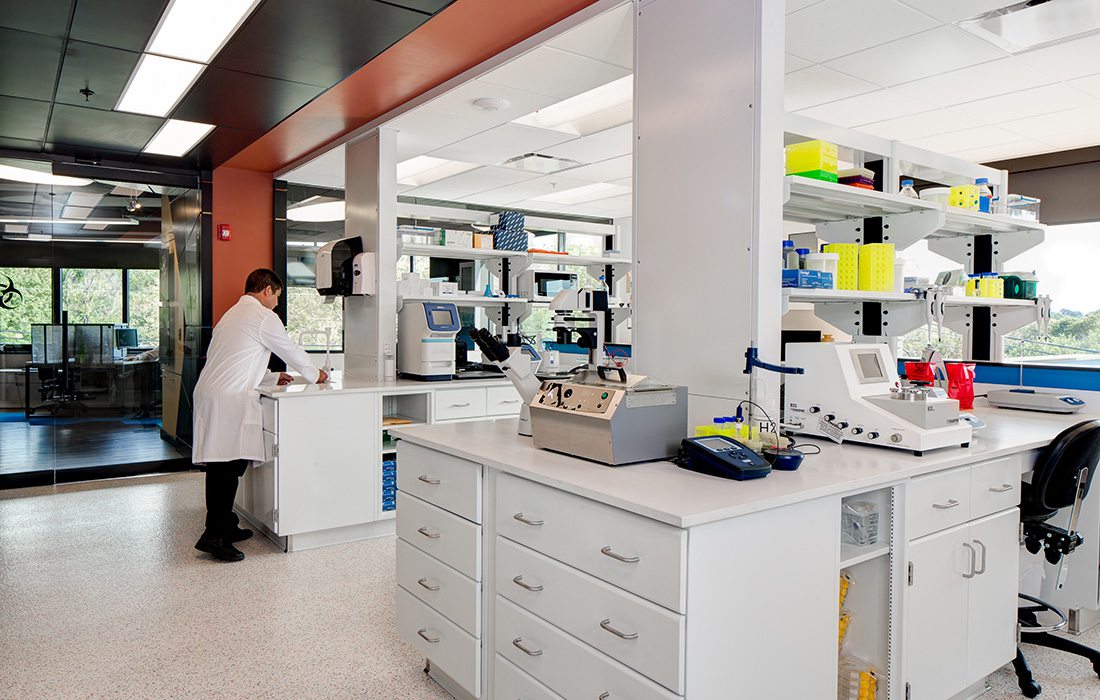
Dynamic DNA Laboratories | Health & Wellness
The hurdle: A shortage of SARS-CoV-2 testing was felt across the country as cities struggled to contain the virus. “Larger commercial labs had turnaround times between five and 12 days, which is just too long to wait during such a critical time for the patient,” says Austin O'Reilly, founder and CEO of Dynamic DNA Laboratories.
The pivot: Beginning April 1, Dynamic DNA partnered with local health institutions and started SARS-CoV-2 testing. The genetics lab's usual business includes administering DNA testing and offering family and ancestry testing, nutrition testing and more. As the lab closed to walk-in clients, it began its testing operations for SARS-CoV-2 and implemented a daily cut-off time to guarantee a quick turnaround on results.
James River Church | Faith
The hurdle: “So many questions needed to be answered when we moved to church online,” says Dave Lindell, executive ministry pastor for James River Church.
The pivot: “James River Church staff have made over 24,000 phone calls to check in on people,” Lindell says. “We transitioned our small groups to virtual meeting platforms like Zoom, FaceTime and Facebook watch parties. We also launched 107 small groups. We have been able to give out over 1,400 bags of groceries, cleaning supplies and care packages… We have delivered over 100 pizzas and 170 dozen cookies to emergency workers serving Springfield and Joplin. Our average church online attendance has increased 619% compared to last year. More people than ever were a part of the Easter services with an estimate of over 120,000 people watching online.”
Craft Sushi | Food & Beverage
The hurdle: “Quite literally overnight, revenue dropped by 70%,” says Michael Cho, co-owner of Craft Sushi. “There was a period of shell shock the first week of shutdown. As a quick service restaurant, we already did a healthy percentage of our business as carry-out and delivery orders.”
The pivot: “We pulled ourselves together and scrambled to increase our presence on our delivery partners’ portals [like] DoorDash and GrubHub. We added phone lines and launched an online ordering platform. The biggest thing we’ve done to pivot our operation is increase our presence at Mercy. We secured a contract back in February to bring Craft Sushi into the Mercy Main Campus cafeteria one day a week. Basically, we set up another Craft Sushi line with our staff to provide the same experience as they would have in our restaurant. We lobbied to stay on with them when the shutdown began and have increased our presence to three times a week. It has been a lifeline for us as we serve between 120 and 160 Mercy employees and guests per shift. And it’s a win-win, as the Mercy staff loves having a fresh, customizable lunch option on campus. We’re also proud to be the only remaining commercial account that is still supporting Urban Roots Farms at this time. We are a local business supporting local.”
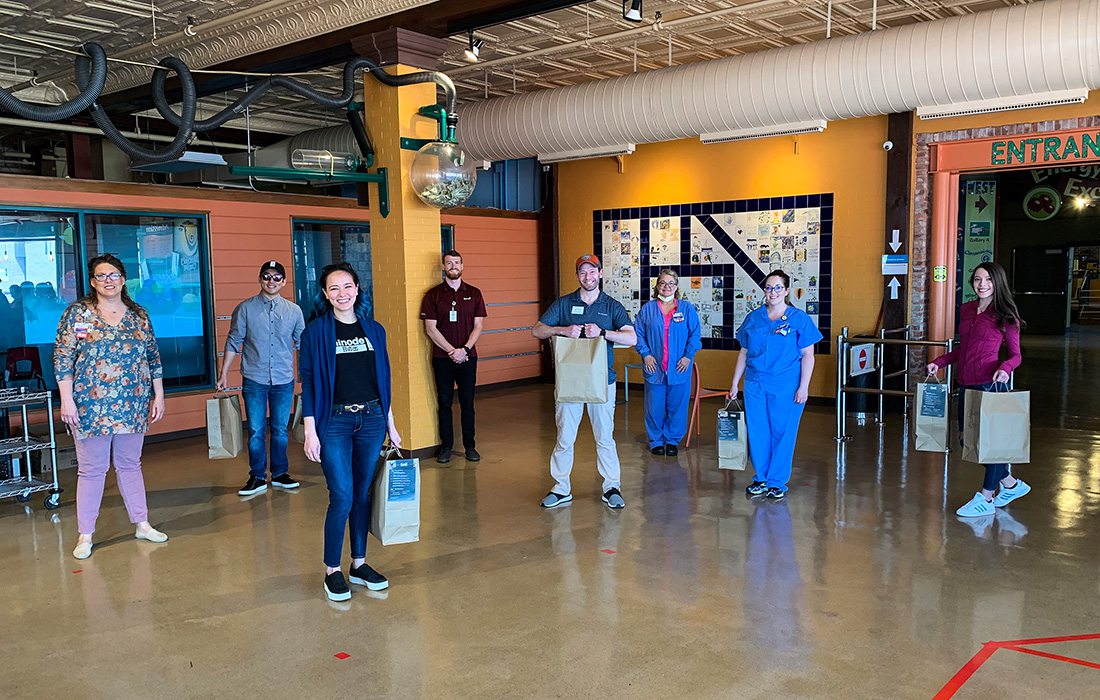
Discovery Center of Springfield | Nonprofit
The hurdle: Rob Blevins, Executive Director of the Discovery Center of Springfield, began developing contingency plans before COVID-19 reached southwest Missouri. In mid-March, he began conversations with the Springfield-Greene County Health Department (SGCHD) about ways the Discovery Center could cater to the community in the time of a crisis. When local school districts closed, the SGCHD worried about childcare needs, especially for health care workers, and Blevins stepped up to the plate.
The pivot: Blevins shut down the Discovery Center to the public and turned it into a temporary childcare facility for health care workers, doubling his staff, taking down all science exhibits and turning the open space into defined classrooms. He also applied for and earned a temporary childcare license to legally run the facility. The operation is pricy—running at full capacity costs $10,000 a day—but Blevins says he is determined to keep the facility operating. As he says, “my team doesn’t quit.” Others, like the Ozarks Regional YMCA and SPS, are also offering childcare.
Grocery Alternatives and Meal Kits | Food & Beverage
Aviary Cafe, European Cafe, Thai Express, Rib Crib, Springfield Progress
The hurdle: Restaurant owners across the region closed their lobbies as the stay-at-home order took effect. The result was a loss of business that rippled through the region.
The pivot: To combat the loss of revenue, some local restaurants including Aviary Café, RibCrib, Thai Express and European Café began offering grocery services as an additional revenue stream. For example, Aviary has introduced the “Aviary Pantry Box,” a new bulk order that includes five pounds of flour, five pounds of sugar, five pounds of potatoes, two onions, two loaves of bread, two toilet paper rolls, two pounds of butter, one gallon of milk and a dozen eggs.
RibCrib and European Café offer similar items, and Thai Express has discounts for first responders, law enforcement and health care workers. Thai Express is also allowing customers to purchase one bottle of hand sanitizer. These are just four of many area restaurants offering pantry items and household staples.
Other restaurants, like Progress, are offering meal kits and cocktail kits for customers to create at home.
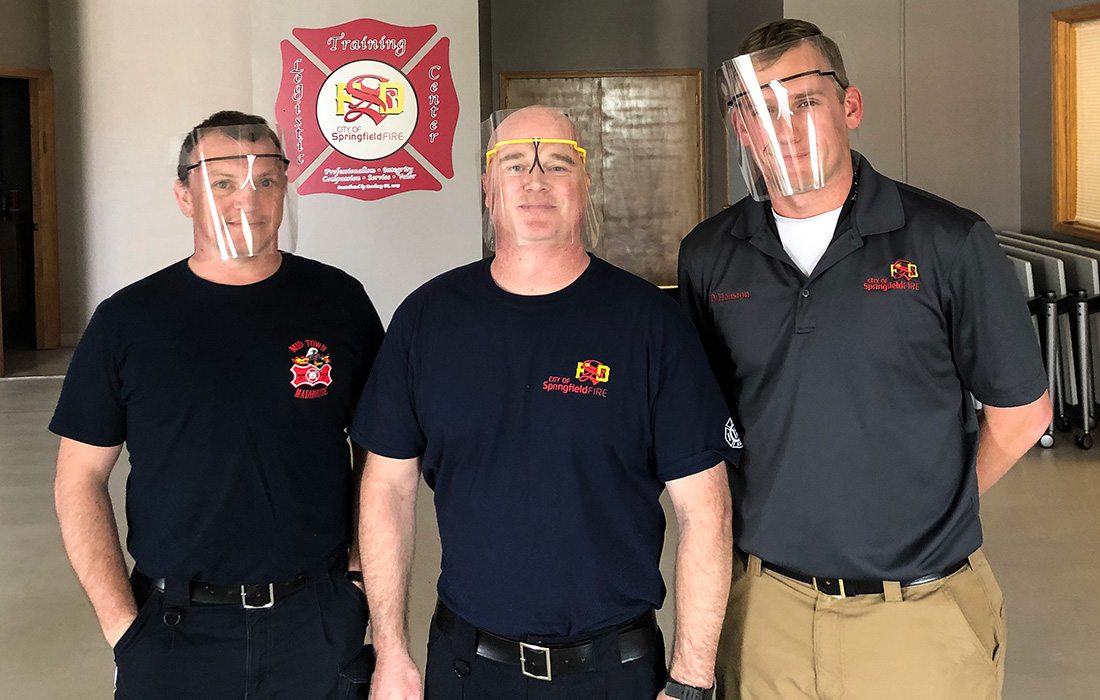
Producing Personal Protective Equipment (PPE) | Manufacturing
Missouri State Libraries’ Innovation Lab, nPrint Graphix, Polyfab Plastics
The hurdle: Across the country, health care professionals and first responders struggle to find personal protective equipment for workers. It’s a problem also being felt by local health institutions.
The pivot: Companies like the Missouri State Libraries’ Innovation Lab, nPrint Graphix and Polyfab Plastics began producing much-needed PPE. Tyler Drenon, innovation strategist at the Missouri State Libraries’ Innovation Lab, partnered with the Jordan Valley Innovation Center to produce masks for first responders. Custom plastic fabricator Polyfab Plastics expanded operations for its medical clients and manufactured thousands of face shields and aerosol boxes, which are used during intubation, for the local health community and beyond. Owner and CEO of nPrint Graphix John Fugitt says his company partnered with Bayer Pharmaceuticals to produce more than 20,000 face shields. “It is times like these that you have to pull your team together and brainstorm for what you can do to help fill the need,” Fugitt says.
“It is times like these that you have to pull your team together and brainstorm for what you can do to help fill the need.”— John Fugitt, owner and CEO of nPrint Graphix
Loren Cook Company | Manufacturing
The hurdle: “Probably the hurdle that we recognized immediately was the fact that we had no way of prioritizing production or orders to meet the need,” says Jim Meats, vice president of marketing for Loren Cook Company. “If you ordered [a product] today, maybe a normal lead time would be six weeks. Instead we were getting orders for products that needed to be shipped within a couple of days.”
The pivot: “We put together a team whose sole purpose was to identify and prioritize those projects so that we could address the needs as quickly as possible,” Meats says. The company has definitely found its groove. Meats says Loren Cook was selected by GM to provide a specific ventilator to ventilate a 3D printer that was making prototypes for their new production cell. In addition, Loren Cook produced ventilators for CoxHealth's new COVID-19 ICU unit.
Kraft Heinz Company | Manufacturing
The hurdle: Kraft Heinz Company saw a surge in demand for products like mac and cheese, ketchup, pasta sauce, capri sun and Kool-as people began stockpiling food, says Michael Mullen, senior vice president of corporate affairs.
The opportunity: To accommodate the growth in demand, Mullen says the company's “manufacturing plants around the world are operating at peak capacity day and night.” Mullen says Kraft Heinz is “making fewer varieties of some products, so we can focus on those in highest demand.” This all comes as Kraft Heinz's “Foodservice business is seeing significant decreases, as people are cooking and eating at home instead of restaurants.”
Photos courtesy Atrium Hospitality, This is a before/after shot of a suite set up as a working office for a local guest.
Residence Inn by Marriott Springfield | Hospitality
The hurdle: Marc Foreman, general manager of Residence Inn by Marriott Springfield, says occupancies throughout hotels in Springfield “plummeted” during the quarantine.
The pivot: “Our apartment-type suites are perfect for those that wanted or needed to self-quarantine, but not be at home,” Foreman says. “We also offered our suites as day-use office space for those whose homes weren’t large enough or who needed better WiFi speeds. Residence Inn by Marriott Springfield also took care of housing for first responders and [Federal Emergency Management Agency] during the quarantine, while our team members ensured everything was sterilized. These actions helped the Residence Inn by Marriott [Springfield] stay ahead of their competition in occupancies.”
Seriously Clean, Ltd and Nixall | Manufacturing
The hurdle: Supplies like disinfectants, sanitizers and toilet paper disappeared due to stockpiling.
The Opportunity: One local company decided to take action. Nixa-based manufacturer Seriously Clean, Ltd. registered its disinfectant and sanitizer with the United States Environmental Protection Agency for a list of products that meet the agency’s standards to use against SARS-CoV-2, the virus that causes COVID-19.
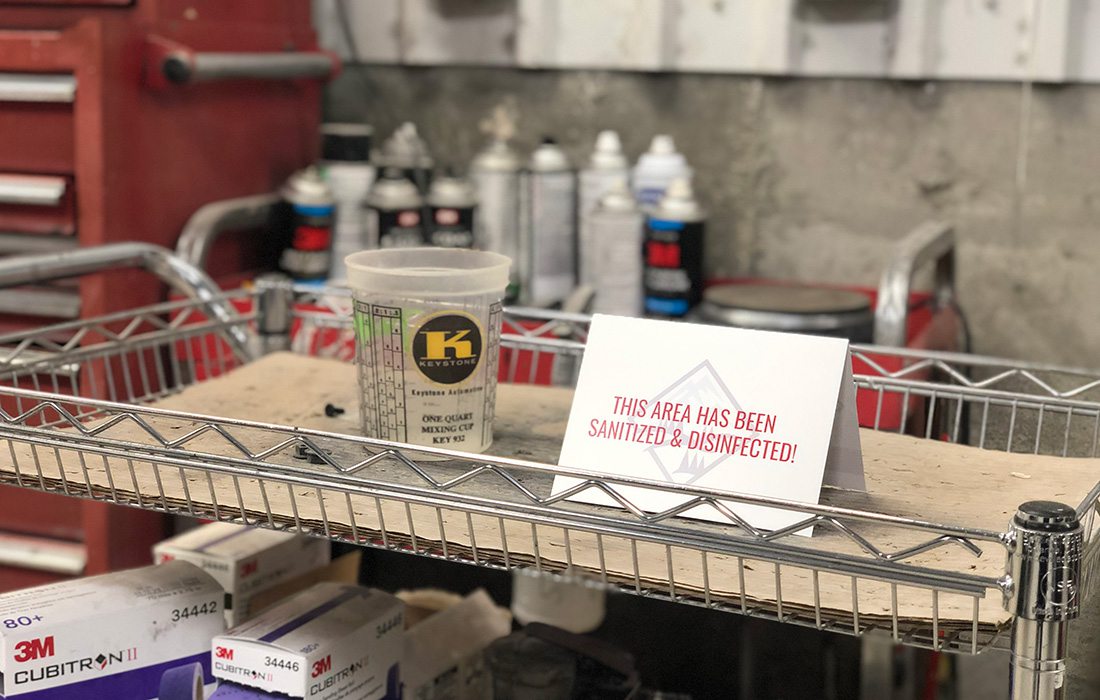
Summit Safety Cleaning, LLC | Small Business
The hurdle: “Like many businesses, we’ve seen the trickle-down impact of businesses that shut down or cease operation, and how that can impact the entire supply chain,” says Jake Woolfenden, owner of Summit Safety Cleaning, LLC. “Our core business is OSHA compliance consulting, so as our customers are impacted, we too have been impacted by cancellations or delays. These directly impact our cash flow, so we immediately become concerned with our own survival.”
The pivot: “I began researching commercial disinfecting equipment and immediately ordered thousands of dollars in equipment and disinfecting product before it was completely gone to hospitals around the country,” Woolfenden says. As soon as they received the proper training, they began disinfecting warehouses, manufacturing sites, offices and more.
Maxon Fine Jewelry | Retail
The hurdle: “The main challenge with COVID-19 is that we have essentially been put out of business for the time,” says Jessica Harmison-Olson, partner of Maxon Fine Jewelry. “Before the regulations took place, we were focused on the safety of our customers and team members and will continue to be once the stay-at-home order is lifted.”
The opportunity: Harmison-Olson says the store is now offering virtual appointments and curbside pickups. In addition, team members are furthering their gemology education through courses with the Gemological Institute of America and the American Gem Society.
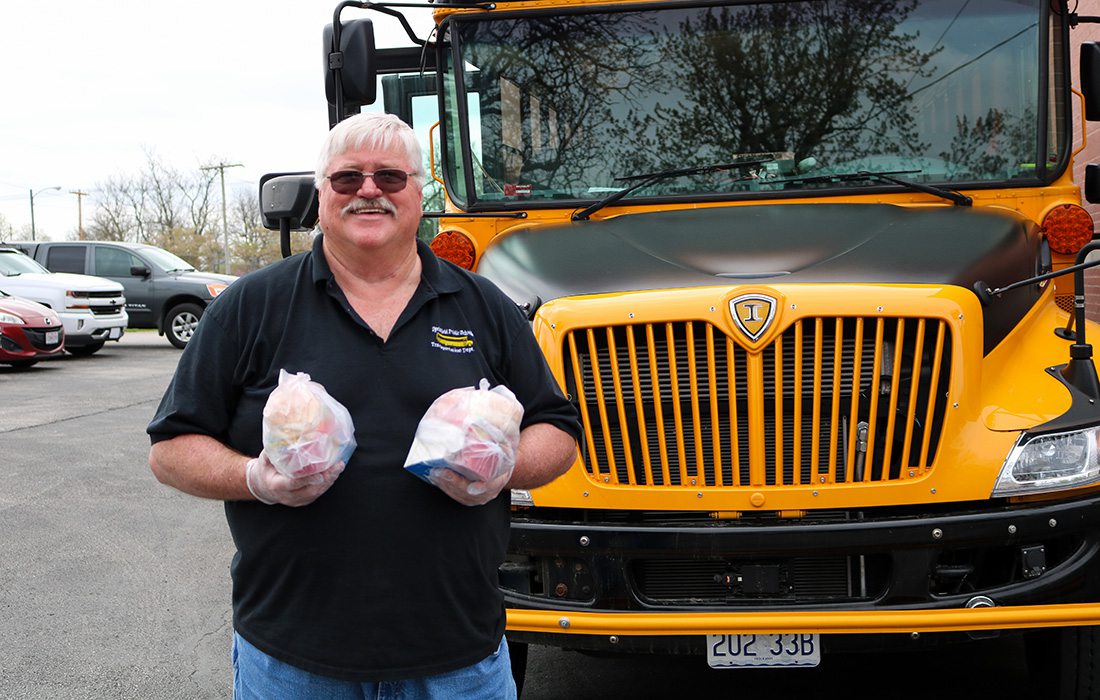
Springfield Public Schools | Education
The hurdle: The same day Greene County and the City of Springfield implemented a stay-at-home order, Springfield Public Schools (SPS) announced schools would also remain closed following spring break. Eventually, Governor Mike Parson announced the closure of all public schools until the end of the school year. The announcements meant that SPS needed to find a way to continue education and feed its students.
The pivot: Springfield Public Schools switched to an online learning platform called SPS at Home, which will be used throughout the remainder of the school year. More than 20,000 students now use that platform while younger students work through printed packets of curriculum. In addition, the district started a meal program, which serves approximately 70,000 meals each week; began offering childcare services are also now available to health care workers and emergency responders; and delivered 2,000 hotspots to students who do not have reliable internet access. This was a $37,000 investment approved by the Board of Education.
Relief Fund for the Arts | Arts & Culture
Gillioz Theatre, Springfield Contemporary Theatre
The hurdle: The Gillioz Theatre and the Springfield Contemporary Theatre (SCT) had to cancel or postpone multiple performances during the shutdown. According to Rick Dines, managing artistic director for the Springfield Contemporary Theatre, “as of March 12, [the theatre has] had no ticket revenue and won't have any until we are able to gather audiences for performances again. Also, our major fundraising season of the year typically comes in April [and] May after we announce our upcoming season. The excitement of the new roster of productions always engages donors, underwriters and supporters. It generates season ticket sales. Being unable to announce a new season, we have put that momentum on hold.” As for the Gillioz Theatre, Executive Director Geoff Steele says the theater postponed nearly 13 shows.
The pivot: “We recently launched SCT's COVID-19 Relief Fund in order to bring in necessary funds to help us keep the organization afloat until we are able to produce again,” Dines says. “To date, we have raised just over $29,000 donated by mail, our website or our Facebook campaign… We were also fortunate enough to be granted money through the PPP to help with payroll for two months. So we currently feel like we have funding in place to carry us through mid to late June. However, we feel like it could still be a while before we see theatre activity able to resume. So while we are heartened, besides examining options for alternative ways of bringing performances to audiences, we are also looking into ways of further cutting expenses.”
Like SCT, the Gillioz Theatre is doing what it can to sustain funding, but it’s also focused on instilling hope in the community. The theater updated its historical marquee to read “Be Safe, Be Kind, Be Hopeful” and put the messaging on a limited-edition t-shirt.
TownPlace Suites by Marriott | Hospitality
The hurdle: “The COVID-19 crisis has obviously had a severe detrimental effect on the hospitality industry and our hotel business as our occupancy was dramatically reduced in half of March and April because of the travel restrictions and stay at home orders,” says Rita Baron, partner of RTT Hospitality, LLC, the company that owns TownPlace Suites by Marriott.
“The greater impact has been the opportunity to provide support and comfort for our incredible health care professionals...which is also a great morale boost for our team members.”— Rita Baron, partner, RTT Hospitality, LLC
The pivot: “Due to our close proximity, we felt it was necessary to reach out to the hospitals with a discounted rate structure to give health care workers a clean and convenient option to help workers keep their families safe while getting the rest they need,” Baron says. “A small amount of revenue from this has assisted in keeping many of our team members working. The greater impact has been the opportunity to provide support and comfort for our incredible health care professionals in this time of need, which is also a great morale boost for our team members.”
As the local economy starts opening back up, businesses will once again have to pivot, but until then company owners and leaders are taking one day at a time.
Biz 417's Virtual B-School
Join Biz 417 and seven local business leaders on Thursday, June 11 as they discuss firsthand how they were able to creatively adapt to the unprecedented circumstances in order to keep their businesses afloat. Get tickets here.

